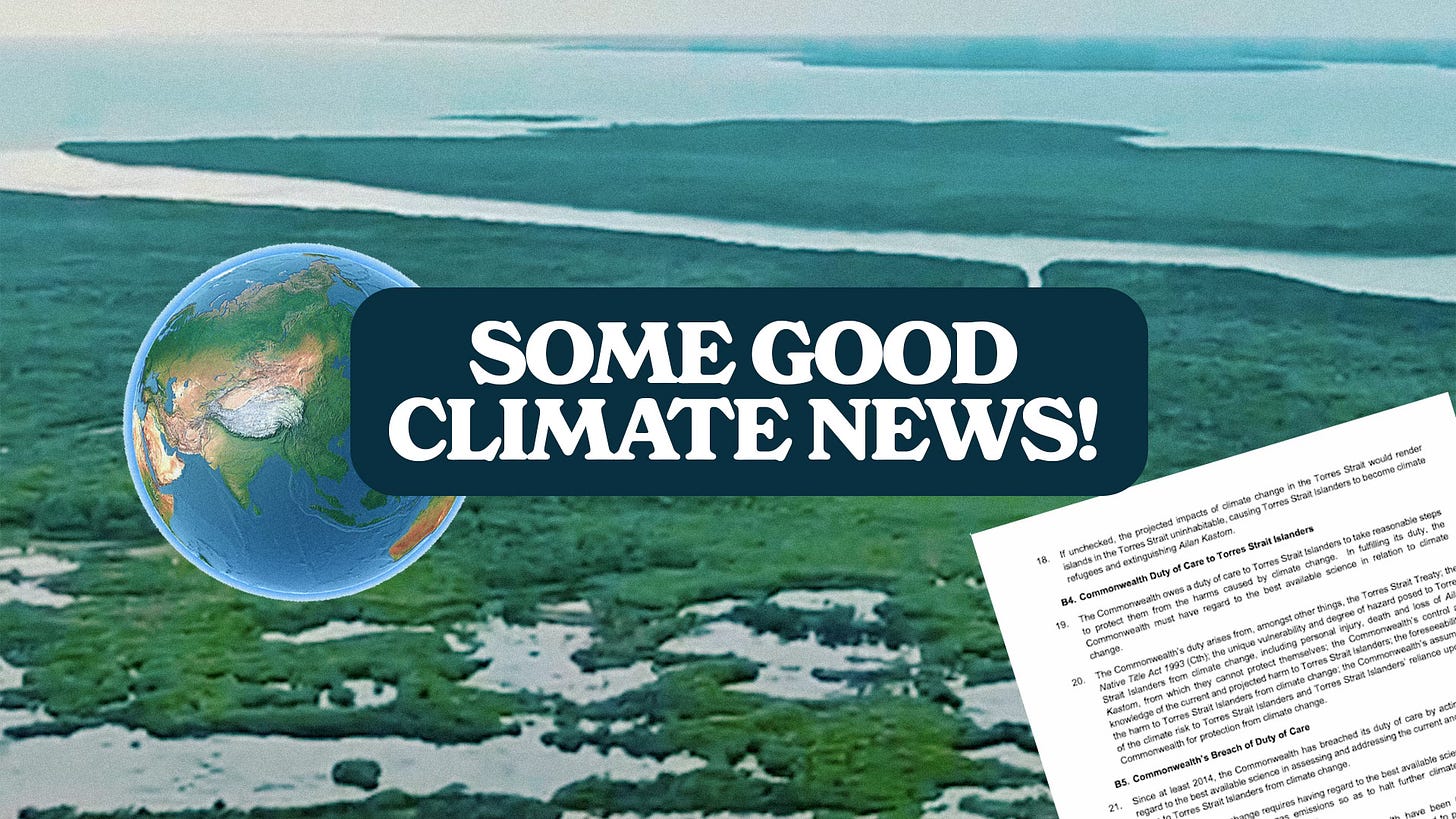Some good news in a literal sea of bad news
The Australian Climate Case could be a came changer for climate action in Australia and for the world.
It’s been a bad few weeks for climate news. There’s been serious flooding in Dubai, China, Afghanistan and Pakistan, a severe heatwave in India and the Great Barrier Reef is going through another very significant bleaching event. On top of this, each of the last 10 months have all respectively set records for being the hottest month ever recorded. Sea surface temperatures are almost literally off the charts.
But there is some good news and it could drastically change the way we take on climate action! Next week there’s a week-long hearing on The Australian Climate Case
The Australian Climate Case is the most consequential case for climate change in Australian legal history.
It was initiated by Uncle Pabai and Uncle Paul, Guda Maluyligal Traditional Owners from the Torres Strait islands of Boigu and Saibai.
They argue that the Australian Federal Government is breaching their duty of care towards their communities in the Torres Strait by failing to address climate change.Without immediate and considerable climate action, the islands in the Torres Strait will soon become uninhabitable and force Torres Strait Islander communities to leave their home, where they’ve been connected to for thousands of years.
Making them some of Australia’s first climate change refugees.
The case is seeking a court order forcing government emissions reductions targets to actually align with the scientific advice in our goals to limit global temperature rise to below 1.5°C (from pre industrial). The Labor Government's policies are currently more consistent with a 3 degree rise in global temperatures.
SIDE NOTE: It can be hard to fathom what half a degree or so of warming even means. The weather fluctuates by waaayy more than that every day and it’s not a big deal right? Well.. wrong.
For every half a degree of warming the atmosphere can hold 7% more moisture. This means heavier rainfall and stronger storms, and more devastating floods. But, in other areas, this same warming intensifies evaporation, causing droughts, increasing bushfires and leaving communities without fresh water.
On top of this, that extra moisture in the atmosphere acts as a thicker and thicker blanket, trapping heat from the sun that would otherwise bounce off the earth and go back into space. That heat then melts ice caps and glaciers, meaning sea levels rise - and island communities will be the first to be affected.
Labor's plan is consistent with 21% more of all of that.
That’s why this case is so important, it’s the first time that anyone in Australia has argued that the Federal Court of Australia should order the entire Government to cut climate polluting emissions.
If successful, the court could order the Federal Government to rapidly slash Australia’s emissions in line with the “best available science” — which is a 75% emissions cut this decade.
To do that the government would have to rapidly invest in huge renewable projects, accelerate our phasing out of fossil fuels and stop all new fossil fuel projects (they’re still approving new coal and gas)even though the science is clear it’s gotta stay in the ground!!!
The Government shouldn’t need to be taken to court to be told not to let parts of the country disappear into the ocean or to stop them acting in ways that increase people in the Torres Strait, Australia and the rest of the world being exposed to increasingly severe and increasingly frequent natural disasters.
But here we are, we’re lucky to have Uncle Pabai and Uncle Paul in this fight, they deserve our attention and our thanks. There’s still hope while there’s still time to act. We can’t afford to tune out now.
Check out more at:
A bit more on warming. At 1°C of warming, where we’re at now:
There’s already more frequent and intense heat waves, droughts, floods, and wildfires as well as widespread and recurring coral bleaching events, damaging reefs and marine ecosystems. Sea-level rises.
1.5°C (Current Target)
Glacier & Ice Melt: Significant loss of glaciers and polar ice, further accelerating sea-level rise and impacting water resources.
Increased extinctions and range shifts in plants and animals.
Declines in crop yields in some regions, affecting food security.
2°C (Critical Threshold)
Extreme Heat Impacts: Dangerous heat waves become common, especially in tropical regions, posing substantial health risks.
"Tipping Points" Risk: Increased risk of triggering irreversible changes like the collapse of major ice sheets, leading to runaway sea-level rise.
Great Barrier Reef Decline: The Great Barrier Reef likely faces near-total loss, severely harming biodiversity and associated industries.
3°C (Very Dangerous Levels)
Cascading Impacts: Extreme weather, sea-level rise, and ecosystem collapse interact, leading to widespread displacement, food shortages, and conflict.
Mass Extinctions: Vastly accelerated species loss on land and in the ocean.
Social Disruptions: Potential for societal breakdown and large-scale migration as habitable areas shrink.







